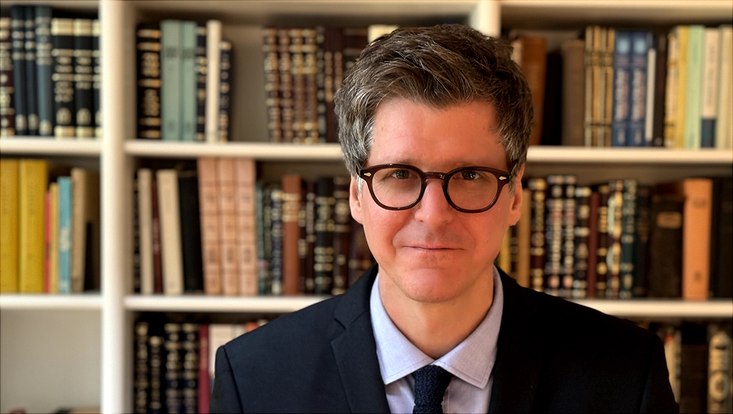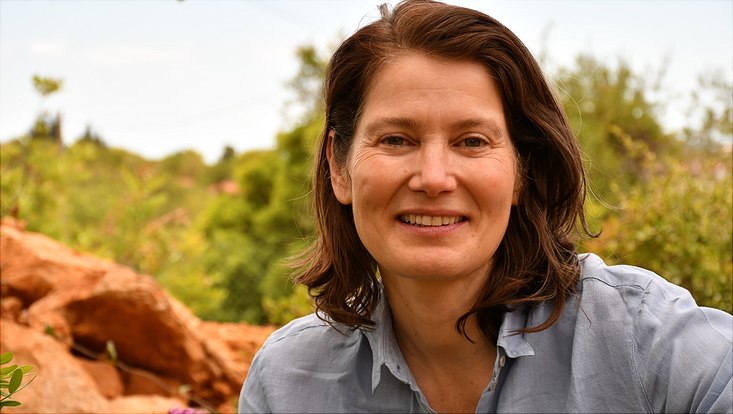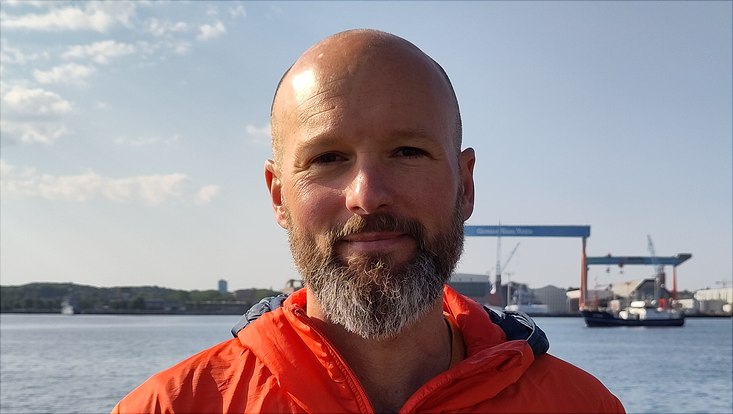Welcome aboard!“It thrills me to teach aspects of the extraordinarily rich Jewish intellectual history.”Prof. Dr. Patrick Benjamin Koch strengthens the Humanities.
21 June 2024, by Koch / editors

Photo: Private
Every year, Universität Hamburg welcomes numerous new researchers. This series introduces them and their areas of research. This time: Prof. Dr. Patrick Benjamin Koch.
Prof. Dr. Patrick Benjamin Koch took up the Heisenberg Professorship for Judaic Studies in the Faculty of Humanities in Summer Semester 2024.
My research area in 3 sentences:
I research Jewish ethical literature and Kabbalah traditions and their transcultural interconnections in the Early Modern Period. I am especially interested in questions at the junction of both topic areas, for example, the relationship between morality and mysticism, or exchange processes that make esoteric knowledge available to a larger reading public. As a Judaism scholar, I approach these topics by studying original-language texts that I analyze using different cultural and religious studies methods.
This is how I explain my research to my family:
I look at how the 3-pronged relationship between the individual, society, and the divine is navigated by Jewish communities in different regions and at different times. In other words, how can the individual approach the divine and how can individuals influence divine spheres? What conduct is considered, in specific contexts, morally good or morally reprehensible? And how do ideas of interpersonal and human-divine relationships change in different life situations?
In Hamburg, the city, and the University, I am looking forward to:
As I have been working at Universität Hamburg for almost 10 years now, I know the working environment quite well. The Heisenberg Professorship, however, gives me the unique opportunity to work with the institute’s, the department’s, and the faculty’s colleagues to shape Jewish studies in Hamburg, its future and networks, long-term. I am really looking forward to that. Because I only just recently settled in Hamburg, I am especially looking forward to exploring the city and its cultural scene, to attending concerts, and to enjoying its vegan restaurants and copious water.
These are my plans at Universität Hamburg:
In the upcoming months, I will concentrate on introducing the bachelor’s program in Judaic studies in Winter Semester 2024/25 and the overhaul of the extant master’s program and I will help prepare the institute’s 10th anniversary festivities. I will also become more actively involved in further developing the Department of Religions.
In the upcoming years, I would like to set up an international exchange program for students and as part of my Heisenberg funding, I am planning to move forward on my current research project on holy legends in the Kabbalah in the Early Modern Period.
In the Cluster of Excellence Understanding Written Artefacts, I am part of an interdisciplinary project group working on a pilot study to create an interactive 3D platform of the Jewish cemetery in Königsstrasse in Altona. The platform should be designed so that, on the one hand, researchers can make important research data available and, on the other, Hamburg’s Jewish history can be made available to the larger public in virtual and augmented reality.
This is why students should attend my courses:
It thrills me to teach aspects of the extraordinarily rich Jewish intellectual history, and to question clichès about Judaism. This often leads to moments of surprise in my seminars. That’s why I am looking forward to students in all subject areas who are open to something new and have fun working on topics with me that have fascinated me for years.
Reaching out to the world: I work with the following international and federal institutions and universities:
The small international group of researchers in the discipline of Jewish thought, to which I also belong, works together very closely and collegially. I have always felt it a great privilege to be a part of this community. I have a lot of academic friendships through my alma mater, the Hebrew University in Jerusalem. In the past, I already cooperated with colleagues from other Israeli universities, for example, the Bar-Ilan University in Ramat Gan and the Open University in Ra´anana, and plan to continue in the future. I also nurture good contact to the Institute for Israel and Jewish Studies at Columbia University in New York and to the Leonard and Helen R. Stulman Jewish Studies Program at Johns Hopkins University in Baltimore that I would like to build upon in the next few years.
My research is important to society because:
The most common associations with Judaism in Germany continue to be the Shoah and the Middle East conflict. What people often overlook is how much more a serious study of Jewish traditions and topics has to offer. The social relevance of our discipline is terrifyingly clear in the resurgence of anti-Jewish and anti-semitic hostilities that, unfortunately, do not end at the gates of Universität Hamburg. And although Judaic studies are first and foremost concerned with the scholarly study of Judaism in all of its facets from an historical and linguistic perspective, I always see it as my discipline’s social responsibility to deconstruct prevailing stereotypes and prejudices and to defend the ideal of a pluralistic society.
The German Research Foundation’s Heisenberg Programme
Smoothing top researchers’ path to a tenured professorship is the aim of the Heisenberg Programme run by the German Research Foundation. The German Research Foundation funds the Heisenberg Professorships for 5 years, after which universities fund the position from their own budgets.


